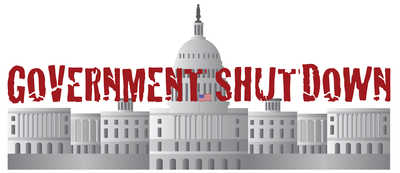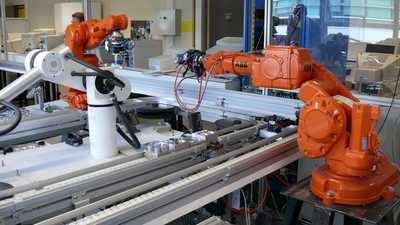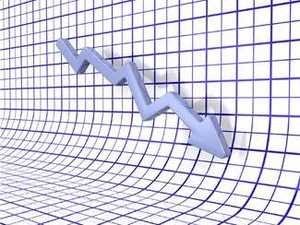| Home | About | Archives | RSS Feed |

The Independent Investor: Will the Lights Go Out?
 |
The deadline looms. There is no deal in sight. Various political factions are jockeying to get their demands met. It is all part of an annual compromise to fund the government for another year.
So what else is new?
If the government does shut down on Saturday morning, it will be the 18th such occurrence in U.S. history. In every case, the nation has survived, although at times the cost has been great. There was, for example, a 16-day shutdown back in 2013 that resulted in a $24 billion hit to economic output and caused 850,000 workers to be laid off.
We all know it costs the American people more to shut down the government than it does to keep it open. In this age of partisan politics, where compromise is a rare commodity, the drama of a government shutdown goes on year after year. At the 11th hour, a series of horse trades normally occurs, allowing both sides to kick the can down the road for a little while longer until the next deadline looms.
You might have thought that with a Republican-controlled House, Senate and presidency, that passing a spending bill would have been smooth sailing. Far from it, readers may recall that in years past, the Republicans have controlled the House, but the threat of closing the government occurred anyway. That's because there are so many splinter groups within the GOP that there is always someone or some faction that insists on more or less spending; usually more on defense and less on everything
else.
In the Senate, although the Republicans hold the majority of seats (52), you still need 60 votes to pass a spending bill. That requires the cooperation of eight Democratic Senators. To get their votes, the Democratic leadership wants legislation passed that would protect "The Dreamers" from deportation. Those 700,000-plus illegal immigrants who were brought to the U.S. as young children and are now caught up in the web of President Trump's animosity towards all immigrants, legal or otherwise.
The Democrats also want to reverse Trump's decision to halt monthly subsidy payments to insurance companies offering health care to low-income people. Those demands fly in the face of ultraright Republicans, many of whom want spending cut (except for defense) in all social programs, especially those involving Obamacare and immigrants.
Thursday, President Trump and Republican congressional leaders were meeting with Chuck Schumer, the Senate's Democratic Leader, and Nancy Pelosi, his counterpart within the House.
The betting is that they will all agree to disagree, but extend the existing spending bill by two weeks.
That would enable the GOP to finish up their tax package before re-focusing on a spending plan.
If so, that would simply kick the can down the road to just before Christmas. Given that only 18 percent of voters would go along with even a temporary shutdown of the government, the hope is that our legislators would be loath to cause a shutdown during the holiday season.
I am not sure I agree with that. The Republicans seem oblivious to voter sentiment. Their tax bill has less than a 30 percent approval rating among Americans, who rightly believe the "tax cuts" benefit the rich and corporations, while savaging most other Americans. Both the president and his party have their own end game, which does not include the majority of voters.
However, even if we do see another shutdown, the impact will be short-lived both for the economy and the markets. Maybe that is what the Republicans are counting on.
Bill Schmick is registered as an investment adviser representative and portfolio manager with Berkshire Money Management (BMM), managing over $200 million for investors in the Berkshires. Bill's forecasts and opinions are purely his own. None of the information presented here should be construed as an endorsement of BMM or a solicitation to become a client of BMM. Direct inquiries to Bill at 1-888-232-6072 (toll free) or email him at Bill@afewdollarsmore.com.
The Independent Investor: The Bots Are Coming
 |
One no longer needs to imagine a post-apocalyptic world where humans are hunted into extinction by intelligent robots. While a shooting war may not break out between the two sides before 2030, a new study by the McKinsey Global Institute indicates that as many as 375 million human workers will be replaced by automation.
Most readers are already aware that companies using high degrees of automation, such as Amazon, are decimating the brick and mortar method of selling products. Most analysts believe it is inevitable that this trend will extend to all kinds of products. Pharmaceuticals and food are just the most recent items to be transitioned over to the internet. While this will add convenience, lower prices, and speedy delivery to consumers, it comes at a cost. That cost is in the loss of jobs.
This new study by the McKinsey Global Institute predicts that this trend will continue. Jobs most at risk will be those that require physical activity. Everything from lathes to tractors will become automated, putting most machinery operators out of work. But it doesn't stop there.
Fast food services of all kinds will no longer need human help. Bank tellers, data collection and all types of processing services will also succumb to automation. Humans involved in back-office processing throughout myriads of industries will no longer be needed. Nor will many financial occupations from mortgage origination, paralegals to maybe even elements of money management.
Many of those developments are already happening, but the pace of change will accelerate. One can only imagine the consequences worldwide if workers simply do nothing but await their fate. What will be necessary, according to the study, is for both the private and public sector to embark on an enormous and lengthy program of re-training. It will require decades to transition those vulnerable workers, to teach them new skills in order to land tomorrow's jobs.
In an ironic twist of fate, some professions that have been scoffed at for decades could turn out to be the most lucrative job opportunities down the road. While many of my clients wring their hands over the high cost of a college education for their children, some are starting to wonder if a college degree is really worth the cost. Vocational schools are far cheaper and the starting salaries for many grads outstrip those with a college degree (depending on the major).
Most of us are already aware that the demand for some professional services is outstripping supply. Just try and find an electrician who can show up when you need one. Trades like plumbing, carpentry, landscaping and those that provide elder and child-care, among others, are already in high demand. The McKinsey study believes that will continue. Wouldn't it be something if, at some point in the future, plumbers will earn more than money managers or lawyers?
Some skills, such as managing people, those skilled in social interactions, professional sales or applying a specific expertise will probably never be replaced by robots. But that does not mean that those workers can rest on their laurels. The days when you could get out of school, enter the work force and never look back are already over.
If you are like me, you spend a good portion of your year attending various continuing education courses just to keep up with the changes in your profession. Just a week ago, as an example, our entire company spent the week in Chicago attending various courses on investment, estate planning, financial planning and more.
The fact that this trend is already spreading throughout this country should not be lost on any of us. Today, there are hundreds of thousands of jobs that remain vacant simply because there are no skilled workers to fill them. In order for this to change, a concerted effort by both corporations and the government must be put into place. Is anyone listening?
Bill Schmick is registered as an investment adviser representative and portfolio manager with Berkshire Money Management (BMM), managing over $200 million for investors in the Berkshires. Bill's forecasts and opinions are purely his own. None of the information presented here should be construed as an endorsement of BMM or a solicitation to become a client of BMM. Direct inquiries to Bill at 1-888-232-6072 (toll free) or email him at Bill@afewdollarsmore.com.
The Independent Investor: Why Stocks Continue to Climb
 |
As we approach the end of the year, most investors are both dumb-founded and pleased at the stock market's performance. President Trump and his followers would like us to believe it is all because of them. Hog wash.
There has been no substantive legislation since the new administration took office. Promises can only take us so far. Some say any further upside will be short-lived, because living on hope alone has already taken us too far. And yet, somehow the economy is still growing, even gathering momentum.
Recall, too, that Donald Trump and the Republican Party gained power on the promise of undoing many of the trade agreements the U.S. has forged over the past 40 years. This was perceived by foreigner leaders (and their people) as a huge negative for the world economy.
Despite the president's posturing and his actions to pull the U.S. out of the TPP and now NAFTA, nations like India, China, Japan, most European nations, as well as many emerging markets, have experienced stock market gains that have left the U.S. averages in the dust. This happened despite the President and his tweets.
So, if it isn't Trump, why are stock markets going higher? The truth is that 45 of the largest economies in the world are experiencing growth at the same time. This has not happened for over a decade. As that growth continues, global equities gather more steam. However, as time goes by, some will do better than others.
But before you give credit, make sure you know where and who to give credit to. Don't look to the world's elected leaders as the cause, despite their claims. Quite the contrary, most elected officials worldwide did nothing. Some, like those in the U.S., actually prolonged the crisis by cutting government spending, despite the pleas of our central bankers to do more, not less, in an effort to save the country.
The real heroes of the day were central bankers. Ever since the financial crisis, central bankers, who are appointed officials and not answerable to short-sighted politicians, saved our collective bacon. The U.S. Federal Reserve Bank, under the leadership of Ben Bernanke, single-handedly led the world, step by painful step, out of the worst economic disaster since the Great Depression. Other bankers around the world, after some hesitation, followed his lead and the rest is history.
Sometimes we forget this, especially when leaders who did absolutely nothing but hinder this effort, now take credit for the work of a handful of officials around the world. Here in the U.S., the Fed-engineered recovery has allowed corporations to not only build a huge war chest of cash in the event of another downturn, but also generate record profits and sales. Unemployment has also declined to historically low levels while inflation remains benign. The same thing is occurring (with a lag) around the world.
And now, we find the Fed once again taking leadership in its effort to normalize monetary policy. So far, they have been doing a bang-up job in that effort. Notice that they have done that while our politicians on both sides of the aisle continue to bicker, posture, but accomplish nothing.
So given the heated recriminations and political disagreements that are sure to crop up around the dinner table this Thanksgiving, why not raise a glass and toast the real heroes who have given us this year of prosperity and plenty. Hip, hip, hurrah to central bankers everywhere!
Bill Schmick is registered as an investment adviser representative and portfolio manager with Berkshire Money Management (BMM), managing over $200 million for investors in the Berkshires. Bill's forecasts and opinions are purely his own. None of the information presented here should be construed as an endorsement of BMM or a solicitation to become a client of BMM. Direct inquiries to Bill at 1-888-232-6072 (toll free) or email him at Bill@afewdollarsmore.com.
The Independent Investor: Cracks in the House of Saud
 |
Over the weekend, the government of Saudi Arabia announced multiple arrests of royal family members as well as other governmental officials. The official explanation was a new campaign to root out corruption, but many believe the raid was a power grab by the reigning Crown Prince Mohammed bin Salman.
Corruption in Saudi Arabia is as common as sand. It is what makes the wheels run so global observers discounted that excuse. The assumptions ranged from a thwarted coup against the reigning family to a consolidation of power orchestrated by the heir apparent.
As a result, gold jumped over $10 an ounce, oil spiked 3 percent and investors held their breath expecting another shoe might fall in the days ahead. Police arrested 49 people, 11 princes, four ministers and dozens of former ministers in the pre-dawn hours of Sunday. There was a fatal shootout between police and one now-dead Saudi prince, while a mysterious helicopter crash killed several other ministers and a high-ranking member of the royal house.
As the smoke clears, it appears that the 32-year-old crown prince, Mohammed bin Salman, is cleaning house, consolidating power, and eliminating any real or imagined rivals within the country. One of those arrested, billionaire Alwaleed Bin Talal, is a well-known global investor with large holdings in American companies.
King Salman elevated Prince Mohammed to heir apparent over other, more senior, princes in the royal line of succession, less than three years ago. That didn't sit well among numerous cliques or factions within and outside of the family. The grumbling grew louder when the young prince announced his "Vision 2030." A far-reaching economic policy which is pushing the Kingdom to explore new business opportunities outside of the country while seeking economic diversification away from its decades-old reliance on oil.
The prince wants to modernize the country's institutions, re-train the work force, and revamp the country's antiquated culture and attitudes to reflect more western ideals. His recent drive to liberate Saudi women from centuries of, at best, second-class citizenship has heartened his supporters, but created consternation among some traditional Saudis.
In any other third world country, a weekend action to consolidate power would barely register among global financial markets, especially within the Middle East. What is so remarkable about the Saudi situation is that it happened at all. Saudi Arabia has long been a pillar of stability in a region where death, violence and political turmoil is an everyday occurrence.
For over 70 years, the U.S. and Saudi Arabia have had a workable agreement. In exchange for guarantees of security, the Kingdom made sure that there would always be a free-flow of oil to global markets. We believed (and still do) that the flow of oil is essential to the stability of the international economy. That pact has withstood the tests of time from the 1973 oil embargo through the attacks of 9/11, where 15 out of the 19 passenger jet hijackers turned out to be Saudi citizens. But times are changing.
The United States has relied on three assumptions in our dealings with Saudi Arabia: that the Kingdom would remain stable. This weekend's actions call that into question. Second: that despite the rampant corruption, atrocious human rights violations and its ongoing support of the war in Yemen, our government believes the House of Saud remains the optimal regime in relation to U.S. interests. Finally, the U.S. assumed that the royal family would continue to promote stability in the regime aligned with Western interests.
The emergence of Iran, its efforts to become the number one regional power in the Middle East, and the proliferation of various terrorists groups have altered the Saudi's response to regional geo-politics. The Saudi's new-found willingness to flex their diplomatic and military muscles in pursuit of a foreign policy that may no longer be aligned with ours has America on edge.
It is the risk that Saudi Arabia will not muddle through that has investors worried and global financial markets a bit tense this week. The sooner we know exactly what has transpired within the House of Saud, the better it will be for financial markets.
Bill Schmick is registered as an investment adviser representative and portfolio manager with Berkshire Money Management (BMM), managing over $200 million for investors in the Berkshires. Bill's forecasts and opinions are purely his own. None of the information presented here should be construed as an endorsement of BMM or a solicitation to become a client of BMM. Direct inquiries to Bill at 1-888-232-6072 (toll free) or email him at Bill@afewdollarsmore.com.
The Independent Investor: Are You Ready for a Down Market?
 |
It has been some time since we have had even a tiny decline in the stock market. Human behavior is such that we expect what has come before to continue into the future. When it doesn't, a whole host of emotions arise and most of them will be detrimental to your financial health.
A new survey by E-trade Financial, a discount broker dealer, reveals that well-heeled investors (those with $1 million or more in equity investments) are as bullish as they have been all year. Almost 75 percent of million dollar players are now bullish as we enter this final quarter of the year. Most of these investors are 55 or older and are significantly more optimistic than younger investors.
Some of that bullishness is understandable given the fundamentals of the economy. Gross domestic product continues to grow slowly and some estimates (such as the most recent survey from the Atlanta Fed) indicate that we could see a greater than 4 percent growth rate in the fourth quarter. Couple that with a fairly consistent improvement in corporate earnings and we have an almost Goldilocks environment for stocks.
This is especially telling since many of the upside earnings surprises are coming from cyclical companies, which really do measure the pulse of the overall economy. The same sort of economic results can be found overseas to a varying degree, which works to improve the outlook for the world's economy in general.
The fact that we are entering the historically best period for the stock market all year has also fueled bullish sentiment. This rosy scenario has resulted in fewer and fewer investors (only 9 percent) who believe that the market will see a down quarter between now and the end of the year, while more than 17 percent believe the markets will gain 10 percent or more by New Year's Day.
But what if all this hype turns out to be wrong? How will you handle it if, instead, markets decline? What if all the great gains we have experienced since the beginning of the year are erased in a month or two? You can bet on one thing: the investments which have gained the most will be those with the most downside. It is not a reason to sell them necessarily, but it is a time to recognize how much loss you are willing to accept.
The range of emotions most of us will feel in a sell-off will range from panic, anger, dismay and the overwhelming need to escape (sell). Well, you might think, I will just sell out now and capture my gains before the decline. When the market declines far enough, I will simply buy back in. That's called timing and we all know that doesn't work. Usually, we sell too early and then buy back too late; resulting in more losses than if you had simply held on through the decline.
I know I can tell my clients until I am blue in the face that the markets will come back given enough time. I can remind them that stocks are much higher today even though the markets dropped 50 percent in 2008-2009, 20 percent in 2011, had a 12 percent sell-off in 2015 and an additional 10 percent decline in 2016. But it is little comfort when they are facing not only a loss of gains, but an actual loss to their portfolios.
One strategy you might want to think about is to reduce the risk in your portfolio. As I have written countless times in the past, markets usually decline 2-3 times a year with each decline averaging between 5-7 percent. We are overdue for a decline. No one knows when it will occur but it will. If you are an aggressive investor, and shouldn't be, maybe drop the risk down a notch or two. You can even raise some cash if you want. It depends on your risk tolerance.
How much risk you should take is directly correlated with how much loss you can bear. As an example, if you can't stomach a 20 percent decline in your overall portfolio, you have no business being an aggressive investor. A moderate investor should not even care if he or she experiences a 10 percent decline. There is an old saying, "if you can't stand the heat, you should get out of the kitchen." That's good advice. If you feel you have become too aggressive over the past year, the time to adjust the temperature is now, not when the markets are in the middle of a free-fall.
Bill Schmick is registered as an investment adviser representative and portfolio manager with Berkshire Money Management (BMM), managing over $200 million for investors in the Berkshires. Bill's forecasts and opinions are purely his own. None of the information presented here should be construed as an endorsement of BMM or a solicitation to become a client of BMM. Direct inquiries to Bill at 1-888-232-6072 (toll free) or email him at Bill@afewdollarsmore.com.

